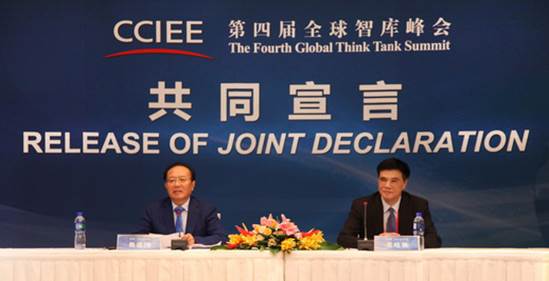The Joint Declaration of the Fourth Global Think Tank Summit Unveiled in Beijing
- Time:2015-06-27
- source:CCIEE
On June 27, the Joint Declaration of the Fourth Global Think Tank Summit (“The Declaration”) was released in Beijing. Wei Jianguo, CCIEE Vice Chairman, presided over the press conference, where as a major presenter, CCIEE Executive Vice Chairman & CEO Zhang Xiaoqiang introduced The Declaration.

Attended by representatives of think tanks, experts, scholars and former senior government officials from around the world, the Fourth Global Think Tank Summit hosted by CCIEE was a grand gathering for the world’s think tanks to meet and share their thoughts and ideas on the Summit’s purpose of “Sharing Human Wisdom and Seeking Global Development”.
Under the theme of “Global Sustainable Development: New Path After 2015”, participants in the Summit had an extensive and in-depth exchange of views on eight major topics, analyzed the recent global economy and its future trends, and put forward suggestions for a post-2015 global development agenda. Participants agreed that this Summit had deepened understanding, broadened consensus and yielded positive results.
The Millennium Development Goals (MDGs) set by the UN at the turn of the century have played a positive role in promoting sustainable global development. Important progress has been made in meeting its key goals including alleviating poverty, popularizing elementary education, promoting gender equality, broadening access to clean drinking water, and lowering child mortality. However, to redress the imbalances of global development and meet the basic needs of the world’s poor remains a daunting task, and development, the defining feature of the times, is still the basis for meeting many global challenges. The world needs to pay more attention to the plight of the poorest and make poverty reduction a priority of the post-2015 agenda. To cut poverty more effectively, efforts need to be channeled to improve infrastructure in destitute areas, upgrade science and technology, enhance education and skill training, develop small-and micro-finance services geared towards poorer communities, fully leverage local resources and comparative advantages, arouse the initiative of people, encourage work-for-aid programs, and mobilize people of all walks of life to reduce poverty in multiple ways.
The growing impact of global economic development on climate and the environment is not a justification for putting a brake on economic growth. Efforts to cut greenhouse gas emissions, protect the environment and pursue economic transformation should be underpinned by continued development and poverty alleviation. New growth models need to be explored that developing circular and low-carbon economies for green growth and that seeking to improve the quality and efficiency of development by integrating industrialization and IT application and furthering “Internet Plus”. It is incumbent on all countries to discharge their due responsibility and enhance their capacity for energy conservation and emissions reduction by adjusting and optimizing domestic industries and energy mix, increasing technology cooperation and transfer, and pumping more investments.
Participants noted the complex changes and profound adjustments taking place in the world, discussed the impact of the global financial crisis on global economy, reflected on the responses to global problems and crises and analyzed their efficacy. All these will significantly help defuse and fend off financial crises and promote global economic development. At the same time, participants held the view that global governance is still plagued by problems of low efficiency, poor coordination and unreasonable rules, and more reform measures are needed to improve the global governance institutions and mechanisms and we need to bring into greater play on the important roles of global governance platforms like G20 and the UN in managing crises and addressing global challenges and hotspot issues. A more effective coordination mechanism needs to be established to foster synergy among international organizations, governments of all countries, business communities and social forces. Equal-footed partnerships of win-win cooperation should be in place, with more respect to different national conditions, development stages and models.
The role of think tanks in dealing with global issues remains to be strengthened. As economic globalization and IT application continue to gain momentum, the world is facing more serious common challenges than before. Against a backdrop of cultural diversity, inclusiveness and mutual learning, think tanks of all countries can and should play a more positive role in promoting sustainable and healthy growth of the world economy, preserving a peaceful environment for regional and global development, guiding public opinion, and recruiting the best of human wisdom towards these efforts. Participants expressed the hope that think tanks of all countries would keep abreast of the times, enhance capacity building, increase interaction with the governments, the public and the media, and strengthen inter-think tank exchanges and cooperation in diverse ways to draw on each other’s merits for innovation and break new ground for common development.
